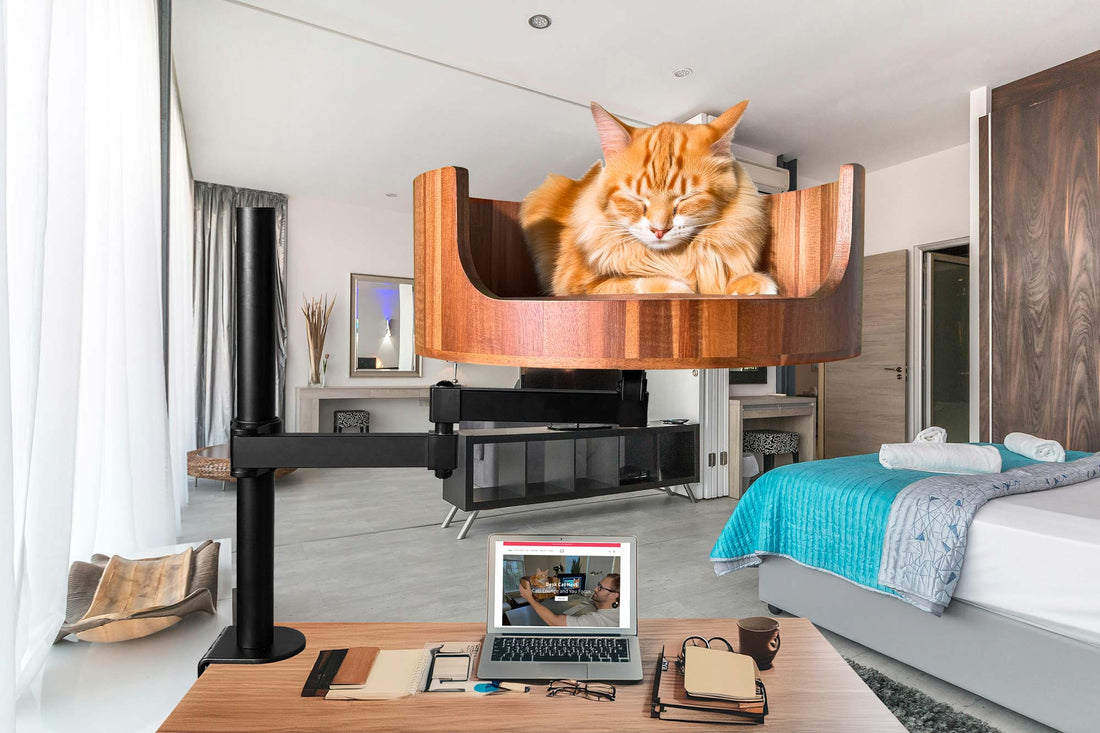
Why Does My Male Cat Tail Quiver? Understanding Behavior
Share
Understanding why your male cat's tail quivers can provide valuable insight into his behavior and emotions. Cats are known for their complex and sometimes mysterious behaviors, and tail quivering is one of those intriguing traits that many cat owners may not fully understand. In this article, we will explore the reasons behind why male cats' tails quiver, shedding light on this common feline behavior.
Desk Cat Nest is a popular online resource for cat owners seeking information on their furry companions' behavior and well-being. Our team of experienced feline experts will delve into the various factors that may cause a male cat's tail to quiver, from excitement and anxiety to aggression and communication signals. By understanding the underlying reasons for this behavior, cat owners can better interpret their pet's body language and strengthen the bond between themselves and their beloved feline friend. Join us as we unravel the mystery behind why male cats' tails quiver and gain a deeper appreciation for the unique behaviors of our four-legged companions.
1. A tail quiver in male cats can indicate excitement or agitation during social interactions.
2. Tail quivering can also signal fear or anxiety in response to unfamiliar stimuli or situations.
3. Understanding your cat's body language, including tail movements, is crucial for effective communication.
4. Tail quivering may be a form of communication between cats or a way to release excess energy.
5. Paying attention to your male cat's tail quivering can provide valuable insights into his emotional state and overall well-being.
Understanding Tail Quivering in Male Cats
Tail quivering in male cats is a common behavior that can have various meanings. One possible reason for this behavior is excitement or anticipation. For example, your male cat may quiver his tail when he is waiting for his favorite toy to be thrown or when he sees a bird outside the window. This type of tail quivering is usually accompanied by wide eyes and twitching whiskers, indicating high levels of alertness.
Another reason for tail quivering in male cats is aggression. When a male cat feels threatened or challenged by another animal, his tail may quiver as a warning sign. This behavior is often seen during territorial disputes or when encountering a new cat in the household. It is important to monitor your cat's body language and intervene if necessary to prevent any potential conflicts.
In some cases, tail quivering in male cats can be a sign of discomfort or fear. If your cat is experiencing pain or anxiety, he may express his emotions through tail quivering. It is crucial to observe your cat's overall behavior and look for any other signs of distress, such as hiding, excessive grooming, or changes in appetite.
Responding to Tail Quivering in Male Cats
When you notice your male cat's tail quivering, it is essential to respond appropriately to the situation. If your cat is displaying signs of excitement, such as dilated pupils and a playful stance, you can encourage this behavior by engaging in interactive play sessions. Use toys that mimic the movement of prey to keep your cat entertained and satisfied.
If your male cat's tail quivering is linked to aggression, it is crucial to address the underlying cause of the conflict. Provide separate spaces for your cats to retreat to and establish a harmonious environment to reduce tension. Consider consulting with a professional animal behaviorist to develop a behavior modification plan and ensure a peaceful coexistence among your pets.
In cases where tail quivering is a result of fear or discomfort, it is essential to approach your cat calmly and gently. Create a safe and secure environment for your cat by offering hiding spots, comfortable bedding, and soothing music. If your cat continues to exhibit signs of distress, schedule a veterinary check-up to rule out any underlying medical conditions that may be contributing to his behavior.
FAQs - Desk Cat Nest as a Solution for Why Does My Male Cat Tail Quiver
Why does my male cat's tail quiver?
Quivering tail in cats can be a sign of various emotions such as excitement, fear, or agitation. It can also indicate that your cat is feeling playful or stimulated.
Is a Desk Cat Nest helpful in reducing my cat's tail quivering?
Providing your cat with a cozy and comfortable space, like a Desk Cat Nest, can help reduce stress and anxiety levels in your cat, which could potentially decrease the frequency of tail quivering episodes.
Will a Desk Cat Nest distract my cat from reasons why his tail quivers?
A Desk Cat Nest can provide a safe and secure environment for your cat to relax and unwind, which could potentially help address the underlying reasons behind your cat's tail quivering. It may not directly distract your cat from these reasons, but it can create a calming and soothing space for your cat to retreat to.
How can I train my cat to use the Desk Cat Nest?
Encouraging your cat to use the Desk Cat Nest can be done by placing some of your cat's favorite toys or treats inside the nest. You can also gently guide your cat to the nest and provide positive reinforcement whenever they choose to relax in it.
In conclusion, choosing a Desk Cat Bed for your male cat can greatly help reduce quivering tail behavior. By providing a comfortable and secure space for your furry friend to relax and feel safe, the Desk Cat Bed can promote overall well-being and reduce stress levels in your cat. With its cozy design and high-quality materials, this product offers a valuable solution to address the root cause of tail quivering in male cats. Invest in a Desk Cat Bed today to give your cat the comfort and security they need for a happy, healthy life.



















































